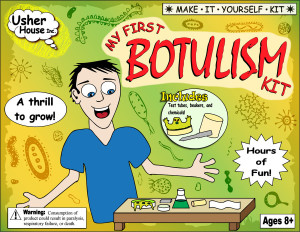Mrs. Kalisz, my middle school family studies teacher, scared the crap out of me by telling stories about paralysis and warned of the dangers of botulism by holding up a bulging can of beans. All the food safety and home food preservation stuff I’ve done since then has confirmed that botulism is a nasty affliction.
Of the 20-30 cases of botulism in the U.S. every year, the majority are linked to improper home canning. Deviating from the prescribed steps can create the perfect environment for Clostridium botulinum spore outgrowth, germination and toxin production. 
According to WMCTV in Memphis, Jay Killen a Horn Lake, Mississippi man has been slowly recovering from botulism for two years. The story reports that Killen consumed the toxin after eating canned beets (although it’s not clear what the source was or if this was confirmed by public health officials).
“One thing he ate changed our entire lives,” said Amanda Killen.
Jay Killen struggles to even eat a spoonful of chocolate pudding, after more than two years in and out of the hospital.
“This is the first I’ve been able to feed myself,” said Jay.
Around Thanksgiving, in 2011, Jay got sick. “I thought I was having a stroke or something,” he explained. So did doctors in the emergency room.
He was unable to move or even breathe; Jay was hooked up to a ventilator and placed in intensive care. By day six, doctors prepared to declare the 40-something former construction worker brain dead.
It may have been a can of beets we had,” said Amanda. “You get to the point where it really doesn’t matter where it came from because it’s not going to change anything,” Amanda explained.
After months tending to her husband, Amanda returned to work, in part, to preserve their health insurance. Jay was unable to even push a nurse call button, so volunteers signed up for weekly two and three hours shifts.
Jay couldn’t speak but regained his ability to blink. Blinking became his means of communication as visitors recited the alphabet.
“I would say at ‘A,’ and I’d say the alphabet, and he’d stop me on the letter I’d write down. And then we’d go to the next letter,” said Amanda.
An interesting side effect from Jay’s illness is that he has fewer wrinkles. Botulism comes from the same toxin used in Botox cosmetic procedures (sort of a weird way to end the story -ben).
In 2012 three folks in Oregon became ill after eating under-processed beets.










